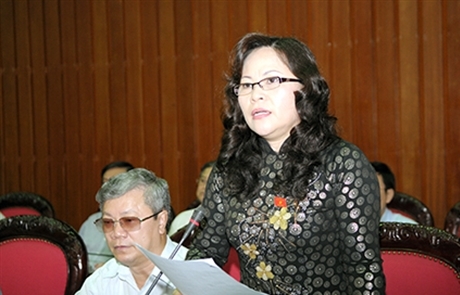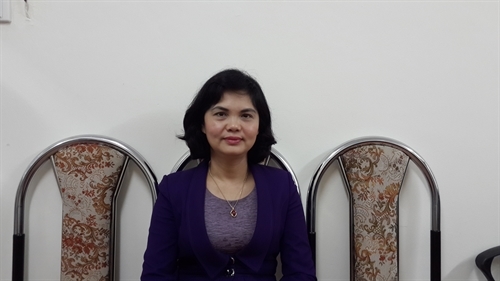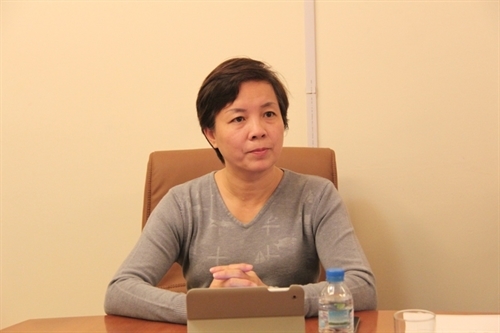 In the Spotlight
In the Spotlight

Outside the country, a Vietnamese entertainer was detained in the US on charges of child sex abuse. The latest statistics from the Ministry of Labour, Invalid and Social Affairs reveal that about 1,000 children are reported to be sexually abused each year. This raises a red flag that points to rampant child sexual abuse in the country. So, what are the causes of this issue? Who can be blamed? Việt Nam News reporters talked to policy-makers, experts, teachers and parents to find the answer.
" />Recently, a school guard of La Pán Tẩn primary school in the northern mountainous province of Lào Cai was investigated for the alleged sexual abuse of 23 schoolgirls, and a male secondary-school teacher was found to have sexually abused his 14-year-old female student in the Mekong Delta province of An Giang.
Outside the country, a Vietnamese entertainer was detained in the US on charges of child sex abuse. The latest statistics from the Ministry of Labour, Invalid and Social Affairs reveal that about 1,000 children are reported to be sexually abused each year. This raises a red flag that points to rampant child sexual abuse in the country. So, what are the causes of this issue? Who can be blamed? Việt Nam News reporters talked to policy-makers, experts, teachers and parents to find the answer.
 |
| Ngô Thị Minh |
Recently, a school guard of La Pán Tẩn primary school in the northern mountainous province of Lào Cai was investigated for the alleged sexual abuse of 23 schoolgirls, and a male secondary-school teacher was found to have sexually abused his 14-year-old female student in the Mekong Delta province of An Giang.
Outside the country, a Vietnamese entertainer was detained in the US on charges of child sex abuse. The latest statistics from the Ministry of Labour, Invalid and Social Affairs reveal that about 1,000 children are reported to be sexually abused each year. This raises a red flag that points to rampant child sexual abuse in the country. So, what are the causes of this issue? Who can be blamed? Việt Nam News reporters talked to policy-makers, experts, teachers and parents to find the answer.
What is the situation regarding the sexual abuse of children in Việt Nam?
Ngô Thị Minh, vice chairwoman of the National Assembly Committee for Culture, Education, Youth and Children:
The number of childhood sexual abuse cases in Việt Nam has been increasing in recent years. Many cases have been detected and denounced. But many cases of chilhood sexual harassment remain undetected.
 |
Phạm Thị Hải Hà, deputy head of the Child Care and Protection Department under the Ministry of Labour, Invalids and Social Affairs:
According to the latest ministry statistics, an estimated 1,000 Vietnamese children are sexually abused each year. But the real number of Vietnamese children being sexually abused may be much higher than estimated. The reported number is only the tip of the iceberg.
In Việt Nam, sexual abuse - especially of children - is such a culturally sensitive issue that the families of both victims and offenders do not expect such incidents to be publicly revealed. A victim’s family fears the incident will harm the future of their child while an offender’s family fears that they will be scorned by the public.
Most child sexual abuse offenders are relatives and acquaintances of victims’ families. Sexual offenders take advantage of naive children to sexually abuse them because children are not wary of their relatives or of people they know.
In urban areas, children who use the internet to chat and make online friends are often targeted by sexual abuse offenders. Ministry surveys reveal that male children addicted to online gaming and internet, who leave their hometown to go to big cities to earn money, are among the highest risk groups for sexual abuse. Sexual abuse leads to physical damage and to long-term psychological trauma for children.
What causes childhood sexual abuse and the problems related to it?
Minh: Reasons include lack of responsibility on the part of child protection agencies. Many victims decide not to report their molesters, due to threats and lack of attention from their parents and family members. Many victims’ families feel ashamed to tell others that their children have been sexually abused.
Homeless children face the highest risk of being sexually harassed.
Families from the provinces move to big cities where their children are more likely to suffer to such offenses because their parents are busy at work.
Strict regulations and severe punishment must be applied, in order to deter childhood sexual abuse. But in many cases, the police, local authorities and even victims’ families can not prove childhood sexual abuse which leads to failure to bring suspected criminals to court.
The most important reason for childhood sexual abuse of Vietnamese children is that traditional moralities are being disregarded.
Adults, especially parents, are busy at work. So they spend less time taking care of their children. They fail to acknowledge the potential risks to their children. Meanwhile, children face more risks from modern life than they did in the past.
Many men are lazy or unemployed. They drink wine all day, lack responsibility and are self-indulgent. All of this contributes to male sexual harassment behaviors.
Many parents also lack awareness of how to protect their children from sexual abuse.
There is also a lack of well-qualified grassroots level officers and activists to protect children and settle issues related to childhood sexual abuse.
Hà: Parents who fail to teach their children to protect themselves from sexual offenders are blamed for the resulting sexual abuse. Parents must tell their children about body parts that other people are not allowed to touch without permission. Children must know how to say no if people try to touch to them. These are very important things that a child must know to avoid being sexually abused. So the role of parents is vital.
In other countries, such as Britain, a child as young as three years old will be taught about body parts, good touch and bad touch. Private parts are any place that your swimming suit covers. Good touch is the touch that makes us smile or feel warm. Bad touch will make us feel scared and anxious.
 |
Nguyễn Vân Anh, director of the Centre for Studies and Applied Sciences in Gender, Family, Women and Adolescents (CSAGA):
Teaching children about sex education in school is not very effective. Most teachers are shy when teaching children about sex education and private parts. The result is that children are also embarrassed to talk or learn about these topics. It’s sad but true that some children are even afraid to tell their parents after being sexually abused because they worry their parents may shout at them.
How can we help children avoid sexual abuse?
Minh: Community-based child protection networks have been set up in many provinces and cities. They are responsible for protecting local children, detecting risks, and rescuing children from danger. But they also need to increase local community knowledge of child protection issues.
The launch of the Family and Juvenile Court, the country’s first specialised court for children, also aims to protect children better.
The National Assembly passed the Child Law on April 5. The law stipulates children’s rights and duties, principles and measures to ensure the enforcement of children’s rights, the responsibilities of State agencies, organisations, educational establishments, families and individuals to exercise children’s rights and duties.
Our children will be better protected if families, schools, agencies, organisations and individuals carry out the law properly.
We also need more activists, officials working in the child protective services network, and people who love children to protect them from danger.
Hà: Parents are advised to give more care to their kids and to talk with them more often, so they can become friends with their kids. Being straightforward is the best way to tell kids about the rules of private parts. Vietnamese teachers should learn from foreign countries’ experiences and find a suitable way to teach children about sex education and private parts - instead of using shyness as an excuse not to do their job as adults and protect children from sexual predators.
The department will co-operate with international organisations for technical support as planned. The goal is to improve skills for parents and schools in order to help children avoid harm from sexual offenders.
Vân Anh: The Ministry of Education is committed to developing a suitable sex-education programme for students from primary through high school, to ensure these children learn enough to protect themselves from sexual offenders. The programme will be adjusted to suit each age group.
 |
Đỗ Mỹ Dzung, teacher at Hà Nội Star School:
We are living in a civilised and developed society. People have more information, thanks to technology and innovations. Recent statistics from the Ministry of Public Security show that between 2011 and 2015, 5,300 of the 8,200 cases of child abuse related to sexual abuse.
Everyone must feel shocked and concerned with the current situation if we compare it to the situation 20 years ago. The situation might have been existed for a long time. But there were no detailed statistics, such as exist now. Obviously, we can’t help but worry for our children. Child abuse exists and is increasing. Is living still safe for children and for us?
There are different reasons for the increasing number of child abuse cases. But from the viewpoint of a teacher and a mother, I think there are three main reasons.
First, the booming of technologies such as Internet and broadcasting has created some negative impacts.
Second, children have not received proper information and education about gender and sex. Many parents are too busy with their work and leave these issues for schools to deal with. Some parents even avoid talking about sex and gender to their children.
Third, schools are supposed to be a main channel to teach children about sex and gender. But schools have not taken advantage of school time to deal with the issue properly. Schools are still concentrating on studying, but are neglecting gender education. Schools should consider gender education as a normal lesson, right from the first grade. Then children can learn to protect themselves.
Parents should also take an active role in educating children about the risks of child abuse, and especially sexual harassment. As a mother of two daughters, my husband and I have take turns guiding our children about gender, sex, and how to avoid being abused. We openly discuss these topics at home, using books and movies.
 |
Đào Thị Thơm, 31, mother of two:
I have never been aware of child sexual abuse of boys, until the recent case where a Vietnamese comedian was held in the US on child sexual abuse charges.
I have a daughter and a son. Until now, I just worried about my daughter’s risk of being sexually abused. So I have taught her lot about that. But I admit that I have never had the same concern for my son, until now. This lack of concern that boys may be sexually abused is normal among young mothers in my hometown in the northern province of Phú Thọ.
Now I realise that I - and maybe many mothers out there - may have underestimated the high risk of sexual abuse of boys. Child sex abuse, whether it’s of a boy or a girl, is cruel and inhumane. Culprits must be strictly punished.
Relevant authorities should introduce channels for education and information about childhood sexual abuse for parents like me to learn how to protect our children, how to teach children to avoid being abused, and what parents should do if they find out their children are being abused. — VNS




